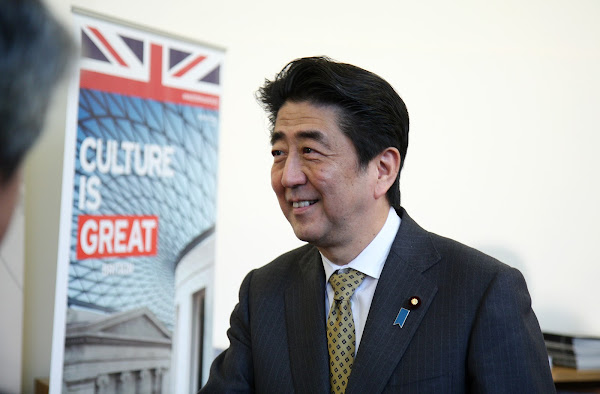Summary: For Japan defense expenditures keep claiming higher percentages of overall budgets through the “Abenomics” of a militarily, socio-economically secure Japan.
 |
| Prime Minister of Japan Shinzō Abe, University College London (UCL), Thursday, May 1, 2014; Japan's Prime Minister gave the keynote speech at the Japan-UK Conference "Collaboration in Research and Education," co-hosted by UCL and the Embassy of Japan in the UK: HM Government's Foreign, Commonwealth and Development Office, Open Government Licence version 1.0 (OGL v.1.0), via Wikimedia Commons |
For Japan defense expenditures are increasing for the fourth straight year under Shinzō Abe, Liberal Democratic Party leader and 57th Prime Minister, according to announcements in the Japanese press Dec. 24, 2015.
The approval by the State of Japan’s cabinet brings the general-account budget for the fiscal year starting in April 2016 a step closer to final passage. The draft budget comes before the two chamber-legislative lower House of Representatives and upper House of Councillors in Japan's unitary parliamentary constitutional monarchy Jan. 4, 2016. Concerns over aging populations, local economies and national security direct greater expenditures on defense, tourism and welfare in anticipation of projected tax and tourist revenue increases.
Officials expect budgetary enactment by March 2016.
The budget furnishes for Japan defense expenditures increased by 1.5 percent over the previous fiscal year in order to comply with legislation passed in summer 2015. The parliamentary legislation gives Japan’s military authority to assist allies under attack, to defend the disputed Senkaku Islands, to launch ballistic missiles and to strengthen intelligence-gathering.
The draft budget has a potentially controversial application if ally assistance leads to sending maritime forces to support U.S. freedom-of-navigation operations in the South China Sea. Such an application is opposed by Prime Minister Abe and through rare public demonstrations since China claims more than 80 percent of the sea’s shipping routes.
Deterrence, effective response and security join to claim 5 percent of budgeted expenditures.
Ministry of Defense purchases and U.S. troop realignments keep national security expenditures at 5.1 trillion yen ($42 billion) of the 96.7 trillion-yen ($799.9 billion) draft budget.
Allocations list Abe's plane among 23 billion-yen midair-refueling aircraft, 103 billion-yen patrol helicopters, 108 billion-yen fighter jets, 143 billion-yen unmanned drones and 173 billion-yen antiballistic missiles. The 1.5 percent increase over the previous fiscal year’s spending makes it possible for the Ministry of Defense to address cyber and outer space security concerns. The budget needs to prioritize other national concerns, which the cabinet-approved draft does by doubling spending on tourism to 20 billion to attract 30 million tourists.
Other prioritizations occur where non-defense “arrows” in the three-arrowed “Abenomics” promote fiscal health.
Aging populations, existing infrastructure and U.S. influences prompt increases to 31.9 billion for social security, 551.9 billion for developing countries and 5.97 trillion for public works.
Bank of Japan and private-sector economists question the draft’s projection of a 25-year high through 57.6 trillion-yen tax revenues from strong corporate profits and weak yen. The bond issuance to budgeted revenues reveals its lowest ratio in nine years while the national debt rises to more than twice the gross national product. Abenomics situates fiscal health in 1.4 fertility rates increased to 1.8, 600 trillion-yen gross domestic product raised by 20 percent and surpluses replacing primary balance deficits.
For Japan defense expenditures turn upon controlling debts, generating revenues and problem-solving Fukushima.
 |
| Fiscal year 2016-2017 budget increases defense expenditures by 1.5 percent over those of the previous fiscal year: The Diplomat @Diplomat_APAC, via Twitter Dec. 28, 2015 |
Acknowledgment
My special thanks to talented artists and photographers/concerned organizations who make their fine images available on the internet.
Image credits:
Image credits:
Prime Minister of Japan Shinzō Abe, University College London (UCL), Thursday, May 1, 2014; Japan's Prime Minister gave the keynote speech at the Japan-UK Conference "Collaboration in Research and Education," co-hosted by UCL and the Embassy of Japan in the UK: HM Government's Foreign and Commonwealth Office, Open Government Licence version 1.0 (OGL v.1.0), via Wikimedia Commons @ https://commons.wikimedia.org/wiki/File:Prime_Minister_of_Japan_(13895799989).jpg;
Foreign, Commonwealth & Development (Foreign, Commonwealth & Development), CC BY 2.0 Generic, via Flickr @ https://www.flickr.com/photos/foreignoffice/
Foreign, Commonwealth & Development (Foreign, Commonwealth & Development), CC BY 2.0 Generic, via Flickr @ https://www.flickr.com/photos/foreignoffice/
Fiscal year 2016-2017 budget increases defense expenditures by 1.5 percent over those of the previous fiscal year: The Diplomat @Diplomat_APAC, via Twitter Dec. 28, 2015, @ https://twitter.com/Diplomat_APAC/status/681459664060563456
For further information:
For further information:
AP/Kyodo. 24 December 2015. “Cabinet Approves Record ¥96.7 Trillion Budget for Fiscal 2016.” Japan Times > News > National > Politics.
Available @ http://www.japantimes.co.jp/news/2015/12/24/national/politics-diplomacy/japans-cabinet-oks-record-¥96-7-trillion-fiscal-2016-budget-focused-welfare-fiscal-health/#.VowkCfmrC50
Available @ http://www.japantimes.co.jp/news/2015/12/24/national/politics-diplomacy/japans-cabinet-oks-record-¥96-7-trillion-fiscal-2016-budget-focused-welfare-fiscal-health/#.VowkCfmrC50
The Diplomat @Diplomat_APAC. 28 December 2015. "Japan Approves Record Defense Budget for 2016/2017." Twitter.
Available @ https://twitter.com/Diplomat_APAC/status/681459664060563456
Available @ https://twitter.com/Diplomat_APAC/status/681459664060563456
“Japan Cabinet Approves JPY 96.7 Trillion Budget for Fiscal 2016.” RTT News > Economy > Asian Economic News.
Available @ http://www.rttnews.com/2594600/japan-cabinet-approves-jpy-96-7-trillion-budget-for-fiscal-2016.aspx
Available @ http://www.rttnews.com/2594600/japan-cabinet-approves-jpy-96-7-trillion-budget-for-fiscal-2016.aspx
PressTV News Videos. 24 December 2015. "Japan govt. OKs record defense budget." YouTube.
Available @ http://www.youtube.com/watch?v=GEpAAgOGg20
Available @ http://www.youtube.com/watch?v=GEpAAgOGg20
Sharp, Andy. 24 December 2015. “Japan Approves Record Defense Budget as China’s Presence Grows. Bloomberg.
Available @ http://www.bloomberg.com/news/articles/2015-12-24/japan-approves-record-defense-budget-as-china-s-presence-grows
Available @ http://www.bloomberg.com/news/articles/2015-12-24/japan-approves-record-defense-budget-as-china-s-presence-grows
No comments:
Post a Comment
Note: Only a member of this blog may post a comment.